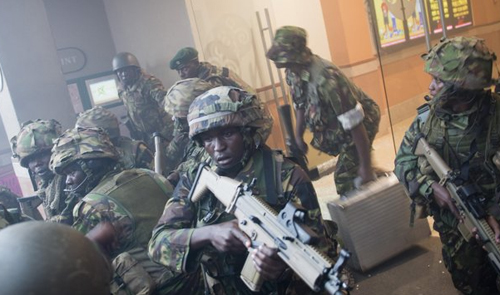
Nairobi, Sep 22: Kenya's president says that 39 people have been killed and more than 150 injured by armed terrorists who attacked an upscale mall in Nairobi.
President Uhuru Kenyatta says he lost "very close family members" in the attack carried out by "despicable perpetrators" of a cowardly act.
Kenyatta said that hundreds of people were safely evacuated from the mall. He said Kenyans courage and sympathy saved lives and reassured countless people.
He said security forces were responding to the attack. He called it a delicate operation and said a top priority was to safeguard the lives of those still being held hostage.
Al-Qaida-linked Somali militant group al-Shabab has claimed responsibility for the attack.
Terrified shoppers huddled in back hallways and prayed they would not be found by the Islamic extremist gunmen lobbing grenades and firing assault rifles inside Nairobi's top mall yesterday. When the coast was thought to be clear, crying mothers clutching small children and blood-splattered men sprinted out of the four-story mall.
The al-Qaida-linked gunmen asked the victims they had cornered if they were Muslim: If the answer was yes, several witnesses said, those people were free to go. The non-Muslims were not.
Somalia's Islamic extremist group al-Shabab claimed responsibility and said the attack was retribution for Kenyan forces' 2011 push into Somalia. The rebels threatened more attacks.
Foreigners are expected to be among the casualties. There are reports of American citizens injured in the attack but the United States State Department said it had no further details.
As night fell in Kenya's capital, hostages remained inside the mall, but officials didn't or couldn't say how many. Two contingents of army special forces troops had moved inside as the stand-off stretched into its ninth hour.






Comments
Add new comment